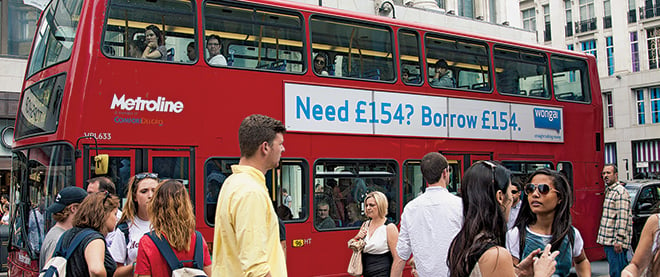Controversial online loan giant Wonga targets Canada
The U.K. online money lender battles critics at home, as Canada beckons
Amer Ghazzal / Demotix / Corbis
Share

Its name, Wonga, is British slang for money. And its television ads, airing in parts of Canada, feature comical puppet pensioners—one with a penchant for skateboards—who speak with exaggerated English accents. Wonga Canada, the online money-lending service, which has been doling out short-term loans here for more than a year, has stayed true to its British roots with an off-kilter marketing message that borrowing money should be easy and fun. But the past few months have been anything but cheery for Wonga’s executives in London.
The company is beset by controversy. It’s been accused by politicians, media and even the Church of England of preying on some of that country’s most financially vulnerable citizens through short-term, high-interest loans. The archbishop of Canterbury has essentially waged holy war on the lender, with a plan to put it out of business by launching competing credit unions offering lower-interest loans. In November, executives from Wonga and other payday loan firms were grilled by MPs at a parliamentary committee. In fact, to say the company has an image problem in the U.K. is an understatement—earlier this month, when a British MP chastized banks for the ATM fees they charge in low-income neighbourhoods, he said the practice “makes Wonga look like Santa Claus.”
Payday loans have always catered to banking’s untouchables—borrowers who for whatever reason, though usually bad credit, don’t have access to lines of credit and other borrowing products. In Canada, provincial regulators have often played a cat-and-mouse game with short-term lenders. But Mark Ruddock, CEO of Wonga Canada, says the company operates differently here in response to unique Canadian consumer demands, and abides by all provincial payday loan regulations. “Our approach has been to provide Canadians with a compelling alternative to what you would know as a payday loan today,” he says. Wonga offers loans in Ontario, Alberta and British Columbia. In addition to Canada, it’s expanded internationally to Poland, South Africa and Spain.
The key difference between Wonga and other lenders is a lack of a physical storefront. Borrowers apply online; to determine how much a loan will cost, including interest, customers pick the size and duration of the loan they want—anywhere from $100 to $600 for between one to 45 days, though repeat customers can take out up to $1,500 at a time. The money is then transferred to the customer’s bank account within an hour. Wonga eschews the legalese in fine print that traditionally accompanies financial transactions, using plain language instead. One section is entitled: “Failure to stick to your side of the deal.”
But despite the transparency, critics take issue with the high levels of interest it charges. At Wonga, a $300 loan for 14 days costs $30. This might not seem like much, but annualized over a full year that works out to an annual interest rate of 261 per cent.
Ruddock said it doesn’t make sense to annualize Wonga’s rates, since the loans are never borrowed for a whole year. On average Wonga’s customers borrow four times a year, he says, for approximately 25 days at a time. However, Gail Vaz-Oxlade, a financial writer and host of the TV show Til Debt Do Us Part, warns payday loan users often get trapped in borrowing cycles, with each paycheque used to pay off the previous loan, thus requiring them to borrow again. “An annualized rate is meant to give you a point of comparison,” she says. “By not annualizing it, it looks like it’s not costing you very much. Not annualizing it only serves the need of the lender, it doesn’t serve the need of the borrower.”
While Wonga ads have played regularly on TV since the company set up shop here, Wonga Canada is a blip relative to its parent company in the U.K., which had sales of $500 million in 2012. Ruddock is guarded about Wonga Canada’s progress, but says it boosted loan volume by a factor of 12 in 2013 compared to the year before. However, in Wonga’s 2012 annual report, the Canadian subsidiary had sales of little more than $100,000 in 2012. The ad spots don’t come cheap, so it’s clear Wonga is making a big bet that Canadians will eventually embrace its service.
But this may come with a risk to both Wonga and Canadian consumers. Like Errol Damelin, Wonga’s founder and chairman in the U.K., Ruddock insists Wonga Canada is careful to only lend to people it believes can pay it back, saying 75 per cent of applications are rejected. Yet it’s been reported Wonga U.K. wrote off nearly $138 million in 2011 because of loans that could not be collected, a figure equal to 40 per cent of its revenue. If Canadians begin falling into the same “Wronga” trap—to borrow a pun from the U.K. press—of being submerged in payday loan debt, the money lender could face a similar backlash here as it has in the U.K.